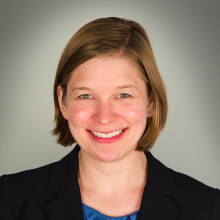April 2010 Spotlight on the SRCD Policy Fellow: Sarah Oberlander, Ph.D.
2009-2010 Federal Executive Branch Policy Fellow
I was fortunate to be able to benefit from the SRCD Policy Fellowship long before I became a fellow myself. My graduate school mentor, Raymond (Pete) Starr, was an SRCD Congressional Fellow from 1980-1981. The fellowship shaped his view of the interdependent roles of research and policy, and I was able to learn about research through that lens as well. Sadly, Pete passed away last spring. He was delighted to know that I would be following in his footsteps as an SRCD fellow. I am now two-thirds of the way through my first year as an Executive Branch Fellow in the U.S. Department of Health and Human Services’ (HHS) Office of the Assistant Secretary for Planning and Evaluation (ASPE). In Human Service Policy’s Division of Child and Youth Policy, my focus has been on three areas: 1) youth, 2) homelessness, and 3) teen pregnancy prevention. All of these activities take advantage of ASPE’s role as a collaboration and coordination center – both within HHS agencies and between HHS and other federal agencies.
Youth. I co-staff the Interagency Working Group on Youth Programs (Working Group), which is a collaboration of 12 federal agencies working together to improve programs and services for youth. I have co-developed content for the recently re-launched website produced by the Working Group, www.FindYouthInfo.gov, which promotes effective community-based efforts through an evidence-based program directory, community mapping tools, relevant content, and resources. The Working Group also hosts conferences to promote collaboration and disseminate information. Last October, I assisted with planning a conference on innovative federal, state, and local collaborations, which included reviewing presentations, meeting with panelists, and developing content for youth speakers. We are currently planning a July 2010 conference that will be a peer to peer dialogue to highlight innovative models and a fall 2010 conference on evidencebased programs and practices. Another important task of the Working Group is developing an overarching strategic plan for youth. We are currently conducting listening sessions around the country to collect information that will be used to inform the strategic plan.
Homelessness. The scope of ASPE’s work on homelessness includes homeless children and families, runaway and homeless youth, chronic homeless populations, and homeless veterans. I am currently the co-lead on one of ASPE’s projects, a roundtable on homeless children’s issues. The contract includes developing a background paper on research and programs related to homeless children and hosting a forum of policy experts, researchers, practitioners, and federal staff to strategize about how to improve responses to children experiencing homelessness. Another homelessness task I have been involved with is the review and decision process for applications to the Federal Surplus Property Program. HHS has the opportunity to transfer federal surplus real property to non-profit organizations for homelessness and public health assistance programs, and ASPE works with HHS’ Program Support Center to determine the eligibility of submitted applications.
Teen Pregnancy Prevention. Recently, I have started working on the Obama Administration’s new Teen Pregnancy Prevention Initiative, which Congress funded with $110 million to replicate evidence-based teen pregnancy prevention programs and develop innovative strategies to address gaps in the field of teen pregnancy prevention. ASPE is an active participant in the Teen Pregnancy Prevention Initiative along with the Office of Adolescent Health, the Administration for Children and Families, and the Centers for Disease Control and Prevention. I have participated in the Teen Pregnancy Prevention Research Evidence Review, which included an independent systematic review of the evidence base for programs to prevent teen pregnancy. This review identified the programs that are considered effective through rigorous evaluation methods and are eligible for funding as an evidence-based program.
ASPE is the principal advisor to the Secretary on policy development, and across the topics I have been working on, my role often involves collecting and integrating information and presenting it to our leadership. I am privileged to have the opportunity to continue this exciting work next year at ASPE, and I look forward to furthering my understanding of the intersection between research and policy
